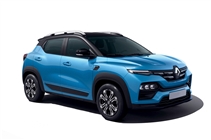Global NCAP, the automotive safety watchdog, has crash-tested the Renault Kiger compact SUV and will soon release its safety rating. This crash test comes soon after Renault’s MPV, the Triber, was tested by Global NCAP and awarded a 4-star safety rating.
Renault Kiger Global NCAP crash test
Renault’s newest model in India, the Kiger, has already been tested in the latest round of Global NCAP’s #SaferCarsForIndia crash tests. The Renault Kiger was subjected to Global NCAP’s offset frontal crash test at a speed of 64kph. As was the case with the Triber, the Kiger tested is likely to be a base or mid-spec variant, equipped with safety kit like two airbags, a seatbelt reminder system and ABS.
Our sources tell us that Renault is expecting a 4-star safety rating for the Kiger, as it is based on the same CMFA+ platform that also underpins the Triber MPV. If that is indeed the case, this result, combined with the Triber’s rating, would prove to be a major fillip for the manufacturer.
The Renault Kiger has seen decent demand, averaging 2,655 unit sales in the last three months. The Triber meanwhile, has proven to be popular thus far, crossing the 75,000 unit sales milestone in April. A 4-star safety rating then is only likely to increase the demand further for both models.
Global NCAP has also tested some of the Kiger’s sub-4m SUV competitors, like the Maruti Suzuki Vitara Brezza, which secured a 4-star rating, and the Tata Nexon and Mahindra XUV300, both of which were awarded a 5-star safety rating.
Renault Kiger: more details
The Renault Kiger is available with two engine options – a 72hp, 1.0-litre, naturally aspirated petrol and a 100hp, 1.0-litre turbo-petrol. While both engines get a 5-speed manual gearbox as standard, the naturally aspirated engine gets the option of a 5-speed AMT and the turbo-petrol gets a 5-step CVT option.
In terms of safety features, the top-spec Renault Kiger is equipped with four airbags, ABS, a seatbelt reminder system, a rear-view camera and rear parking sensors.
Global NCAP: future plans
Going forward, Global NCAP tests are set to get tougher as it is going to introduce additional crash and safety testing parameters by the end of 2021. From 2022, ESC (electronic stability control) test will join the organisation’s test protocols. Furthermore, it plans to incorporate more active safety technology in its testing protocol, as well as introduce a single rating (instead of separate adult and child safety ratings) by 2026.
Also see:
Watch Renault Triber Global NCAP crash test video
2021 Kia Carnival secures 5-star rating in Australian NCAP


